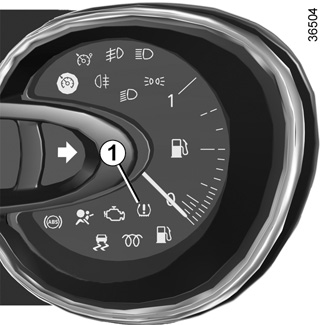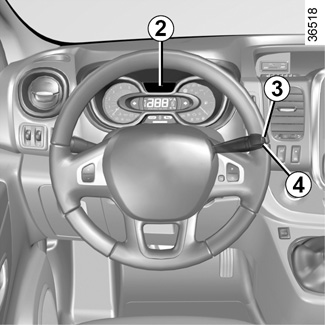TYRE PRESSURE LOSS WARNING

When fitted to the vehicle, this system notifies the driver if one or more tyres lose pressure.
Operating principle
Each wheel (except for the emergency spare wheel) has a sensor in the inflation valve which periodically measures the tyre pressure while driving.
Warning light 1 comes on to alert the driver in the event of insufficient pressure (deflated wheel, punctured tyre, etc.).
Resetting the standard level for the tyre pressures
This should be done:
- when the standard tyre pressure needs to be changed to adapt to usage conditions (empty, carrying a load, motorway driving, etc.);
- after swapping a wheel (however this practice is not recommended);
- after changing a wheel.
It should always be done after checking the tyre pressure of all four tyres when cold.
Tyre pressures must correspond to the current usage of the vehicle (empty, carrying a load, motorway driving, etc.).
This function is an additional driving aid.
The function does not take the place of the driver. It cannot, therefore, under any circumstances replace the vigilance or the responsibility of the driver.
Check the tyre pressures, including the emergency spare wheel, once a month.

Resetting procedure
With the ignition on:
- repeatedly press button 3 or 4 to select the “TYRE PRESSURE SET <PRESS-HOLD>” function on the display 2;
- press and hold (around 3 seconds) button 3 or 4 to start initialisation. Display of the message “PRESSURE REF ONGOING” indicates that the reset request for the tyre pressure reference value has been taken into account.
Reinitialisation is carried out after a few minutes’ driving.
Note:
The standard tyre pressure cannot be less than that recommended and indicated on the door frame.
Display
Display 2 on the instrument panel informs you of any tyre pressure faults (flat tyre, punctured tyre, etc.).
« ADJUST TYRE PRESSURE »
Warning light comes on, along with the message “ADJUST TYRE PRESSURE”.
These indicate that at least one tyre is flat.
Check and, if necessary, readjust the pressures of the four wheels when cold.
The warning light goes off after a few minutes’ driving.
The sudden loss of pressure in a tyre (burst tyre, etc.) cannot be detected by the system.
« PUNCTURE »
The warning light comes on steady, accompanied by the message “PUNCTURE” and a beep.
This message appears along with the ® warning light.
They indicate that at least one wheel is punctured or severely underinflated. Replace it or contact an approved dealer if it is punctured. Top up the tyre pressure if the wheel is deflated.
Warning light ® requires you to stop immediately, for your own safety, as soon as traffic conditions allow.
« CHECK TYRE PRESSURE SENSORS »
The warning light flashes for several seconds, then stays on, along with the message “CHECK TYRE PRESSURE SENSORS”.
This message appears along with the © warning light.
They indicate that at least one tyre is not fitted with sensors (e.g. emergency spare wheel). Otherwise, consult an authorised dealer.
Readjustment of tyre pressures
The tyre pressures must be adjusted when cold (please refer to the label located on the edge of the driver’s door).
If tyre pressures cannot be checked when the tyres are cold, the recommended pressures must be increased by 0.2 to 0.3 bar (3 PSI).
Never deflate a hot tyre.
Replacing wheels/tyres
This system requires specific equipment (wheels, tyres, hubcaps, etc.). Please see the information on “Tyres” in Section 5.
Contact an approved Dealer to fit new tyres and to find out about available accessories compatible with the system and available from your dealer network: the use of any other accessory could affect the correct operation of the system or damage a sensor.
Emergency spare wheel
If the vehicle is equipped with an emer- gency spare wheel, it will not have a sensor. When it is fitted on the vehicle, the warning light flashes for several seconds, then stays on, together with the warning light © and the message “CHECK TYRE PRESSURE SENSORS” appears on the instrument panel.
Tyre repair product and inflation kit
Because the valves are specially designed, only use equipment approved by the approved network. Please refer to “Tyre inflation kit” in Section 5.
Changing a wheel
The system may take several minutes depending on use for the new wheel pressures to be recognised; check the tyre pressures after all operations.